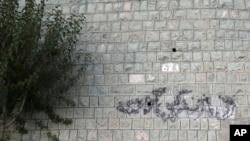The U.S.-based Campaign for Human Rights in Iran is condemning Iran's Supreme Court for upholding the death sentence of Kurdish cleric Mamusta Mohammad Khezrnejad for his involvement in the 2022 nationwide protests over the death in morality police custody of Mahsa Amini.
Khezrnejad, 45, a Sunni Muslim cleric from the western Iranian city of Bukan, was detained in late 2022 for addressing a crowd of protesters at a “Woman, Life, Freedom” rally.
"Martyrs do not belong to one family," Khezrnejad can be heard telling the crowd in footage of the events that led to his detention. "Those who sacrifice their lives for the freedom and dignity of their people and nation, they are the sons of the nation, they hold their heads high and it is God's promise that martyrs will not die."
In December 2023, Khezrnejad was sentenced to at least 15 years in prison for “harming the territorial integrity and independence of the country," and then was handed a death sentence in February after being declared guilty of "corruption on earth."
"Corruption on earth" is a term Iranian authorities use to refer to a broad range of offenses, including those related to Islamic morals.
Thursday's decision to uphold Khezrnejad's execution was handed down by judge Ali Razini, onetime chief prosecutor of Iran’s Revolutionary Court, which supervises all political executions in the Islamic Republic.
The ruling came one day after a statement by the New York-based rights group confirmed that on May 30 six additional prisoners, including juvenile offender Aref Rasouli, "were transferred to solitary confinement in Adelabad Prison in Shiraz, Fars province, in preparation for their imminent execution."
"The only other publicly known individual amongst the six is Morteza Shirmohammadi," the press release said, which also states Iran's judiciary has executed nine protesters over the 2022 unrest, which claimed hundreds of lives.
In March, officials in Tehran issued a report stating that fewer than 300 died in the monthslong street protests. A U.N. fact-finding mission, however, said "credible figures suggest that as many as 551 protesters were killed by the security forces, among them at least 49 women and 68 children."
The CHRI statement, which demands an immediate halt to all executions, says three-quarters of all documented executions worldwide in 2023 occurred in Iran, and that executions surged under the rule of late President Ebrahim Raisi, who was killed in a helicopter crash in May.
A five-day registration period for presidential hopefuls closed Tuesday, and Iran's Guardian Council is expected to issue its final list of selected candidates within the coming week.
Nationwide protests over the death of Amini, who had been detained for allegedly not wearing her headscarf to the liking of authorities, grew into one of the most intense challenges to Iran’s theocratic government in decades.










